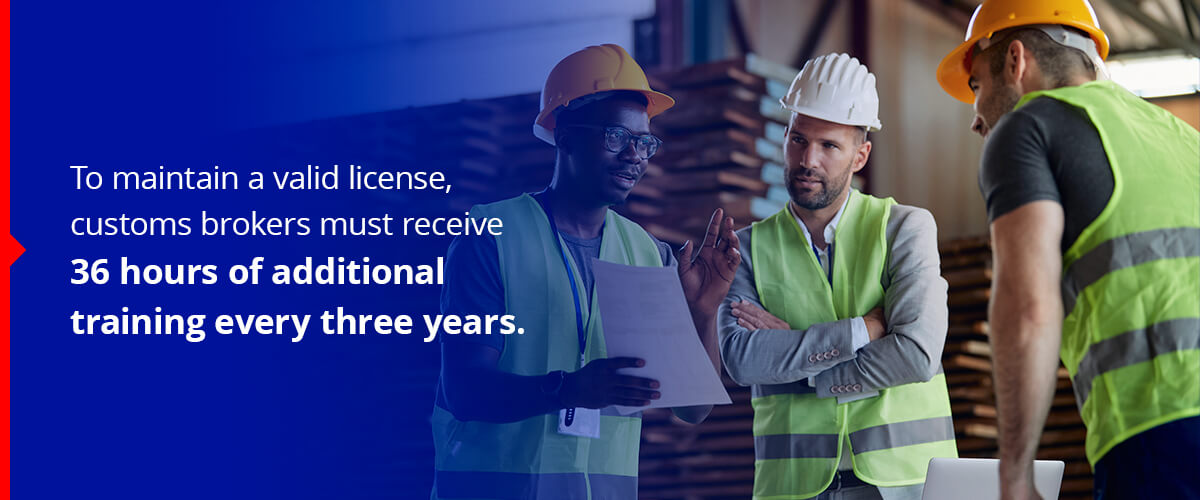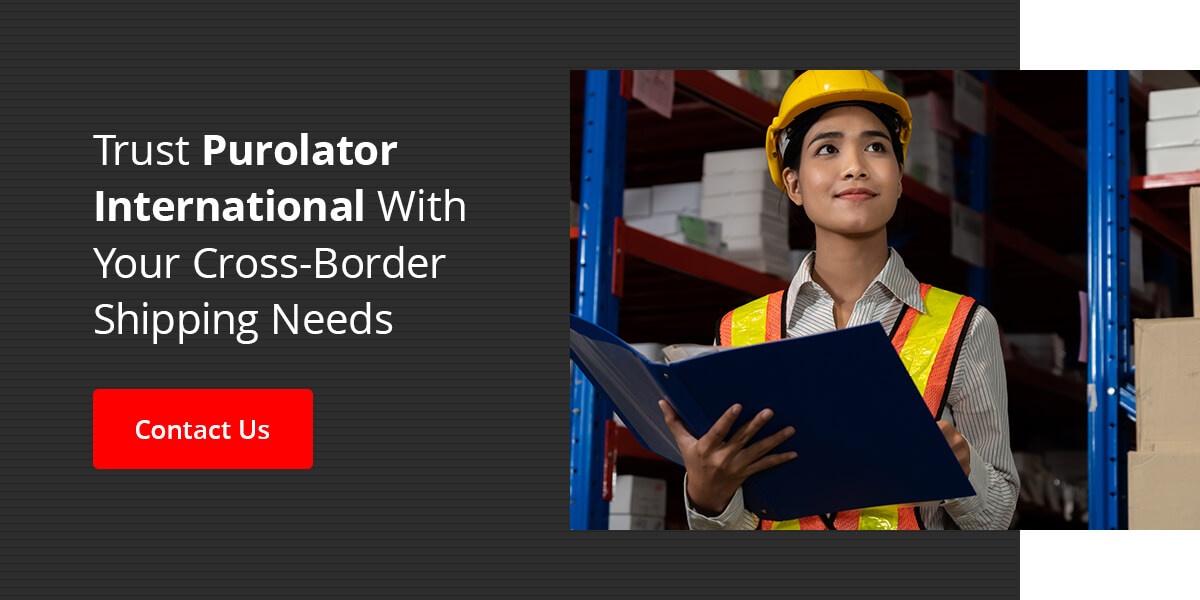Blog
U.S. CBP Updates Customs Broker Education Requirements: What It Means for You

New customs broker education requirements help customs brokers remain knowledgeable about cross-border shipping regulations. Federal shipping requirements in the U.S. and Canada are fluid and change frequently, so working with a licensed, educated customs broker is essential.
Customs brokers check shipments to verify that they meet requirements, helping companies prevent shipping delays and avoid fines. New education requirements ensure customs brokers receive important updated information so companies can depend on them to follow the latest shipping regulations.
- Importance of Licensed Customs Brokers
- How Do Customs Brokers Help Companies Ship Products?
- U.S. Customs Broker License Requirements
- Purpose of Customs Broker Licenses
- New Customs Broker Continuing Education Requirements
- How New CBP Education Requirements Enhance Trade Enforcement
- How Updated Customs Broker Education Requirements Affect Your Business
- Working With an Experienced Customs Broker
- Trust Purolator International With Your Cross-Border Shipping Needs
Importance of Licensed Customs Brokers
Customs brokers help exporters and importers meet federal regulations. They are crucial for international trade because they facilitate compliant cargo movement and protect revenue. Customs brokers oversee international transactions related to the following factors:
- Customs entry
- Merchandise admissibility
- Customs valuation
- Product classification
- Duty payments and drawbacks
- Taxes
- Rebates and refunds
How Do Customs Brokers Help Companies Ship Products?
Customs brokers assist companies with the following shipping requirements:
- Paperwork: A customs broker checks shipment paperwork to ensure it is complete and includes all required documents. Incomplete or missing paperwork is one of the main reasons the border denies shipment entry or delays shipments, so checking paperwork is crucial.
- Various shipment processes: Shipment processes vary based on shipment contents. Customs brokers understand the different requirements for various goods, and they know which organizations regulate and enforce mandates for each type of shipment.
- Code and tax requirements: A shipment’s end destination determines its code and tax requirements. Customs brokers understand each Canadian province’s tax requirements as well as labeling and marketing codes.
U.S. Customs Broker License Requirements
U.S. Customs and Border Protection (CBP) regulates and licenses customs brokers, granting them the authority to assist exporters and importers. To obtain a license, customs brokers must meet the following requirements:
- U.S. citizenship
- 21 years of age or older
- Not a federal government employee
- Good moral character
Customs brokers must pass the Customs Broker License Examination, apply for a license, pay application fees and wait for CBP to approve their application.
Purpose of Customs Broker Licenses
Customs brokers require licenses to prove they have the expertise to follow and enforce federal trade regulations. The Customs Broker License Examination evaluates an individual’s knowledge in the following areas:
- Admissibility requirements
- Entry procedures
- Valuation
- Classification
- Merchandise duty rates
- Applicable merchandise fees and taxes
New Customs Broker Continuing Education Requirements
CBP established a new education regulation for customs brokers, which requires customs brokers to continue their education beyond the Customs Broker License Examination.
To maintain a valid license, customs brokers must receive 36 hours of additional training every three years. Continuing education for licensed customs brokers covers updated U.S. trade laws and changing customs rules.
While the new CBP continuing education regulations require 36 training hours each triennial period, they allow customs brokers to complete fewer training hours during the first triennial period between 2024 and 2027. Following 2027, brokers must meet the 36 educational hour requirement each period.
U.S. Partner Government Agencies (PGAs) and CBP offer courses for customs brokers. They can earn various continuing education credits for free, meeting requirements without a financial burden. Brokers can also participate in third-party training and educational opportunities, but a CBP-selected accreditor must approve them to count toward required credits.
How New CBP Education Requirements Enhance Trade Enforcement
New customs broker education requirements are essential because they help ensure federal compliance. When brokers receive new training, they gain crucial information. Customs brokers must continuously learn new information as the government changes trade laws. Well-informed brokers know how to help exporters and importers comply with federal laws. They can ensure shipments meet regulations, reducing violations.
The more customs brokers learn about evolving U.S. trade laws, the better they can protect the country. Continuing education is an additional protection layer, helping customs brokers prevent illegal activities. Brokers can use updated information to improve their skills and prevent illegal products from entering the country. Trade laws protect consumers and the U.S. economy from harmful, illegal products.
How Updated Customs Broker Education Requirements Affect Your Business
Customs brokers significantly benefit businesses. U.S. customs laws and regulations are strict, and a violation can potentially result in supply chain delays or product bans. Working with a licensed, knowledgeable customs broker helps you comply with federal regulations and avoid these roadblocks.
When you work with a customs broker, your products are more likely to pass the customs clearance process and arrive at the appropriate destinations on time. A broker understands the regulations your products must comply with and the import or export taxes you must pay to receive or ship goods. Customs brokers can also pay merchandise duty rates and bill you. This third-party expertise helps you avoid unnecessary fines and expenses.
The new CBP customs broker education requirements increase a customs broker’s value to businesses. With ongoing education, customs brokers can provide more knowledge and expertise to companies.
Working With an Experienced Customs Broker
It’s important to work with an experienced customs broker each time you ship products internationally. Doing so ensures you meet all federal clearance requirements. You should work with a customs broker who meets federal education requirements since shipping regulations change frequently.
As CBP updates the customs broker education requirements, it’s even more crucial to partner with a trained, licensed broker. Continuous education ensures customs brokers retain their licenses and stay up to date on the latest international shipping regulations.
Purolator International offers cross-border services to help American and Canadian businesses ship products efficiently. Our shipping specialists help companies ship products between the U.S. and Canada. Our hassle-free freight, parcel and express shipping solutions are fast, helping your important shipments meet their destinations on time.
At Purolator International, our team of shipping specialists offers Canadian brokerage expertise. We have the knowledge and skills to verify that shipments comply with CBP requirements. Our experienced professionals can help you avoid fines and expenses, and resolve potential violations before your shipments reach the U.S. and Canadian border.
Trust Purolator International With Your Cross-Border Shipping Needs
Customs brokers must continue their education every three years to remain knowledgeable about customs regulation updates. This new education requirement helps brokers better assist companies and prevent shipping delays.
CBP regulations are fluid, requiring customs brokers to adapt to frequent changes. Working with a licensed customs broker who meets education requirements helps ensure your shipments cross the border on time and without fines.
Purolator International offers expert customs brokerage services to help your shipments pass customs and reach their destinations on time. Contact us to learn more about how we can help you successfully ship your products between the U.S. and Canada.

